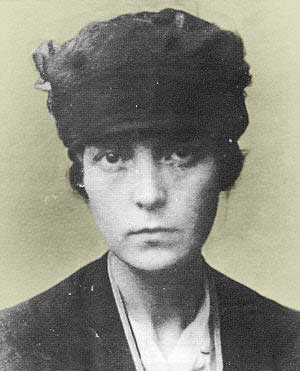
In 1908, Katherine Mansfield left her hometown Wellington, New Zealand, for London, vowing “never to return, said my disgusted heart.” There, she sought a place among the bohemians and literati. Diagnosed with tuberculosis in 1919, she was advised to travel abroad, and spent the last months of 1919 through April of 1920 in Southern France and Italy. Mansfield’s health improved dramatically. From France, she writes to Bogey, the nickname for her husband, John Middleton Murry, about their recent purchase of Broomies, a country house in Sussex, where Murry was based. The couple had met almost ten years earlier, after Mansfield sent a short story to Rhythm, the magazine Murry edited (the story was rejected, though her next submission, “The Woman at the Store,” was published). At the time of this letter’s writing, Mansfield and Murry had been married for a year; the couple separated in 1917.
To Bogey of Broomies Sunday, April 11, 1920
My very own,
All yesterday, off and on, I had waves of delight at the thought of Broomies. I could not have imagined that the fact of us being real little landowners could have made such an extraordinary difference. The feeling of security—have you got it, too? The enormous pleasure of putting up a wall if we choose or putting in a fireplace. I’ll never be able to say what Broomies means, and you found it—my own explorer. It’s our island. I feel the anxiety about money in the future is lessened, too, don’t you? All our geese will lay golden eggs before they become swans… But more than anything I keep writing short prefaces and putting in the left hand bottom-of-page corner ‘Broomies, 1922’. Also, ‘We shall be at Broomies until the fin d’Octobre, when we leave for Genet Fleuri—our small villa in the South’. Oh, Destiny, be kind. Let this be. Let these two children live happy ever after.
By the way, what with these two names, we shall be calling our small son Richard Plantagenet Murry if he doesn’t hurry up. I see SUCH books. Golden bees fly out of them—young dandelions sprout between the pages—the critic discovers the first small aconite on p.54, and by the end of the book he is even slightly freckled. I’m very silly. Forgive me.
L.M. spends all next week hunting for a villa or a flat for next year. I am decided not to be with these people, and the flat I saw—perfect though it was—had more stairs than I like to remember. She’ll find something and I’ll take it, however. The weather was awful yesterday, il pleut averse today. But a bird sings and it is very warm. I do hope May will be warm.
Yes, my precious, we’ll divide our time between Sussex which is you, and the South of France, which is me, mystically speaking. We shall never saddle ourselves with any big responsibility or large house—but we’ll live beautifully. It makes another great joy in my coming back here this winter to know I’ll have the Schiffs at Roquebrune. Do I take violent fancies, Boge? I must say at present I love Violet Schiff. I think you would, too. You would certainly find her very beautiful, as I do. I want you to see her and to talk to her. She is extremely sympathetic.
Jinnie has just come in with your Thursday letter. What a shower of pearls and diamonds tumbles out of your letters! Heavens, how I do love you! Yes, you are perfectly right about the book. Let it be as you wish. I am only too willing to abide by your decision. I am so sorry to have given you so much trouble, dearest love.
Hardy thrills me. It’s an anniversary, I expect—but whose? Oh, it’s very thrilling. And that he should have chosen you. I confess I’d dearly love to go down and see him with you one week-end—very quietly. I wouldn’t talk, but I like to see him and see you together. It’s very good about the American publisher. Richard, of course, rushed to tell me.
How sweet you are! You are so wonderful. I wonder people don’t see the gold ring round your hair. I think you’re perfect.
I fearfully want to see your review of James’s letters. Boge, the paper wants a touch of Lytton and Forster—it looks a trifle depressing, too. There’s so much small type. But that’s just en passant. Goodbye for now, my blessed one.
Wig of Broomies
Would you lend me your copy of Prelude, if you have one?
Katherine Mansfield’s Letters to John Middleton Murry 1913-1922. Alfred A. Knopf. Borzoi Books, New York (1951)


